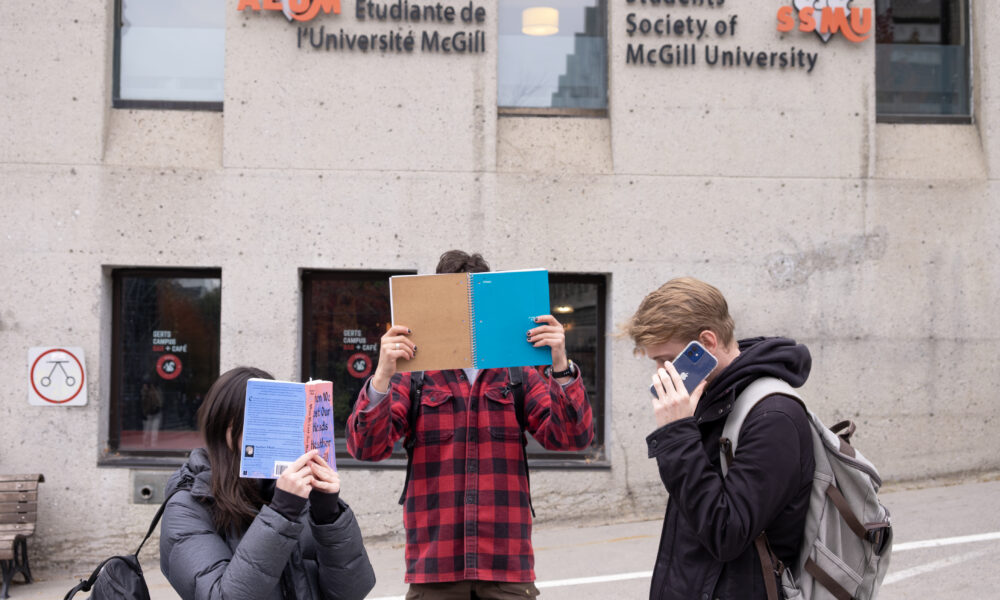Unsurprisingly, forming strong opinions about something that you cannot see or readily gather information about can pose a challenge. This simple phenomenon obstructs the vast majority of McGill students from interacting with, caring about, or even knowing of the Students’ Society of McGill University (SSMU). The SSMU name floats aimlessly around campus, with most only able to recall the most recent scandal covered by an on campus publication. For many members of the student body, SSMU is inaccessible and seemingly non-existent, and this has allowed for corruption to run rampant within the organization. This lack of engagement and accountability on behalf of the student body allows SSMU the chance to cover up its internal issues.
Unless they somehow stumble into the foreboding and unremarkable brutalist cave that is the official SSMU Building, otherwise known as the University Centre, a student will likely never directly interface with SSMU. Considering SSMU’s failure to reach a quorum in its most recent General Assembly, students appear to have little to no interest in the workings of the student union. Of course, there are the innumerable emails that bombard students’ inboxes, imploring them to vote for executives and referendums; but these go largely ignored, made evident by the less-than-20 per cent voter turnout in SSMU’s most recent elections. This gives rise to the question: On a campus where the student government is virtually invisible, how do students gather information about it? The answer is simple: Gossip.
When SSMU is brought up in conversation, its discussants almost always tether it to deliciously scandalous stories of corruption, discrimination and harassment. As a third-year student, the most memorable encounters I have had with the entity of SSMU have been through secondhand accounts of its corporate greed, the thousands of dollars they have allegedly lost due to mismanagement—dollars paid by their constituents—or its disheartening failure to pass particular policies, even if they are supported by the vast majority of students. As our primary interface with SSMU, these narratives portray a student government that functions only to misrepresent and ignore the very people it was made to support.
But campus gossip, while often based in truth, does not provide an accurate picture of the capabilities of McGill’s student union. Despite its ever-so-apparent failings, SSMU can be an excellent resource for students, and it should appear on many more radars. Without organizers and workers in SSMU, there would be no Activities Night, no access to mental health and safety resources like Keep.MeSAFE, no free menstrual products in the bathrooms. Without SSMU, we wouldn’t even have the beloved Gerts Cafe & Bar. Visibility and recognition, however, still remain an obstacle. If SSMU does not make students aware of their resources, how can students partake in them?
When the only news is bad news, students have poor incentive to involve themselves with SSMU. If students only have ears for gossip, why has SSMU not attempted to provide another narrative for itself? This speaks more to SSMU’s indifference toward its reputation than the youthful tendency to stir the pot. Ultimately, SSMU’s invisibility and apparent disinterest in providing an alternative form of self-representation perpetuates the vicious cycle of student disengagement and the union’s inability to accurately represent the student body.
So how can SSMU make itself seen and felt? A simple start would be broader representation. SSMU is meant to serve all of campus, so it shouldn’t exist solely in the University Centre. Members of SSMU should be more active in student buildings, tabling and raising awareness about their mandate and goals for student life. This form of in-person engagement would garner far more success than holding general assemblies over Zoom on weeknights when next-to-no students can attend. By firmly staking its presence on campus, SSMU can better fulfil its role as a union and take responsibility for mending the rift between students and their governing body. Although SSMU could and should be doing more for McGill undergraduates, it could start by making itself known to its constituents. Perhaps, then, that students have a chance of voicing their needs, and hopefully see them met.







